Strengthened Haiti-Venezuela-Argentina Collaboration | Renforcement de la coopération entre Haïti, le Venezuela et l’Argentine
Editorial Comment
English | French
From reading about international collaboration in Haiti, one would get the impression that Haitians are stuck inside a cave and barely aware of the wheel. Yet, Haiti built its own Citadel fortress, cathedrals, ginger-bread houses, and numerous civil works projects. An interesting puzzle, it would seem.
In fact, the Haitian state used to own its own iron works, cement company, flour mills, and many other enterprises that were privatized and shut down in the 1980’s and 1990’s. More recently, the state phone company and national brewery were privatized, and now the ports and airports are under consideration for privatization. It seems that a series of successively worse prime ministers have allowed the country to be stripped of everything but its labor. And even its labor is becoming more and more emaciated every day from hunger.
Certainly, one is grateful for aid from sister countries in these times of dire need. And Haitian farmers have far greater need for traditional tools than the addictive hybrid seeds and poisonous fertilizers on offer from Monsanto. Nevertheless the aid described here is emergency aid. Haiti should make every possible effort to rebuild its industries for the long term and should adopt policies that are consistent with this goal.
Dady Chery, Editor
Haiti Chery
Strengthened collaboration between Haiti, Venezuela and Argentina
By Amos Cincir
Le Nouvelliste
Translated from the French by Dady Chery, Haiti Chery
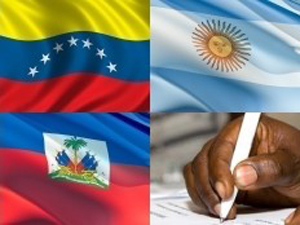 Port-au-Prince, Haiti. A tripartite agreement of collaboration was signed at the National Palace on Wednesday, April 25, 2012 between the Minister of Foreign Affairs and Worship Laurent Lamothe, Deputy Foreign Minister of Venezuela Temir Porras, and Argentinean Ambassador to Haiti Marcelo Sebaste.
Port-au-Prince, Haiti. A tripartite agreement of collaboration was signed at the National Palace on Wednesday, April 25, 2012 between the Minister of Foreign Affairs and Worship Laurent Lamothe, Deputy Foreign Minister of Venezuela Temir Porras, and Argentinean Ambassador to Haiti Marcelo Sebaste.
This tripartite Haiti-Venezuela-Argentina agreement regards agriculture, identification, and literacy.
A donation of 20,000 kits of agricultural tools (shovels, picks, machetes), 10,000 wheelbarrows and 100 tractors with horsepower of 80 to 100 will be granted to Haiti to improve its agricultural system, read the press release. Equipment to facilitate the use of fertilizers, pesticides and seeders, irrigation pumps 3 and 4 inches to exploit small bodies of water, submersible pumps, equipment to popularize drip irrigation, and silos to store crops and seeds (for collectives and families) will also be distributed to the Haitian authorities to enhance domestic production.
 The agreement, which was signed in the presence of the Ambassador of Argentina to Venezuela Carlos Cheppi, Argentinean technicians, Secretary of State for Literacy Ms. Milaine Alexandre, and Office of National Identification (ONI) Director General Jean-Baptiste Saint-Cyr, also aims to enhance ONI’s capacity for an identification project. The main objectives of this project are to:
The agreement, which was signed in the presence of the Ambassador of Argentina to Venezuela Carlos Cheppi, Argentinean technicians, Secretary of State for Literacy Ms. Milaine Alexandre, and Office of National Identification (ONI) Director General Jean-Baptiste Saint-Cyr, also aims to enhance ONI’s capacity for an identification project. The main objectives of this project are to:
- Create a reliable database of all citizens;
- Modernize the existing system;
- Rehabilitate regional physical structures;
- Link local offices to each other and a central office;
- Work to ratify the legal framework for the integration of civil administration within the ONI;
- Equip the ONI with equipment that is more modern and has greater capacity;
- Directly create 8,000 jobs and facilitate access to information that might be useful for partner institutions within the context of their specific missions.
Foreign Minister Lamothe expressed the belief that stronger South-South cooperation can contribute to sustainable development of Haiti and, noted in this context his commitment to increase his efforts to reposition the country as a key partner to sister states in the region.
In addition, a literacy component of the agreement will consist of alphabetizing 600,000 people via the project “Wi mwen kapab” (Yes I can) and 400,000 others via programs depending on the capacities of various communities.
Source: Le Nouvelliste (French) | Haiti Chery (English) | Image: Cathedral in Cap Haitien
Commentaire
anglais | français
On a l’impression, en constatant les projets de cooperation en Haïti, que les Haïtiens sont perdus dans le passé: au fond d’une grotte où ils sont à peine conscients de l’invention de la roue. Pourtant, Haïti a construit sa propre Citadelle, ses cathédrales, et ses maisons gingembres. Un puzzle intéressant, il parait.
En fait, auparavant l’État haïtien détenait ses propres ferronneries, sa société de ciment, sa minoterie, et de nombreuses autres entreprises qui furent privatisées et fermées durant les années 1980 et 1990. Plus récemment, la compagnie nationale de téléphone et la brasserie nationale ont été privatisées. Et maintenant, les ports et les aéroports sont à l’étude pour la privatisation. Il semble que des premiers ministres haïtiens deviennent successivement pires et permettent au pays d’être dépouillé de tout, excepté sa main-d’œuvre. Et même sa main-d’œuvre devient de plus en plus maigre de la faim chaque jour.
Certainement, on est reconnaissant de l’aide des pays frères. Et les agriculteurs haïtiens ont beaucoup plus besoin d’outils que des semances addictives de Monsanto et leurs herbicides toxiques. Néanmoins, l’aide décrite est une aide d’urgence. Haïti doit faire le tout possible pour reconstruire ses entreprises pour le long terme et devrait adopter une politique qui est compatible avec cet objectif.
Dady Chery, rédacteur en chef
Haïti Chery
Renforcement de la coopération entre Haïti, le Venezuela et l’Argentine
Par Amos Cincir
Le Nouvelliste
 Un accord tripartite de coopération a été signé au palais national, ce mercredi 25 avril 2012 entre le ministre des Affaires étrangères et des Cultes, Laurent Lamothe, le vice-ministre des Affaires étrangères du Venezuela, Temir Porras, et l’ambassadeur d’Argentine à Port-au-Prince, Marcelo Sebaste.
Un accord tripartite de coopération a été signé au palais national, ce mercredi 25 avril 2012 entre le ministre des Affaires étrangères et des Cultes, Laurent Lamothe, le vice-ministre des Affaires étrangères du Venezuela, Temir Porras, et l’ambassadeur d’Argentine à Port-au-Prince, Marcelo Sebaste.
Cet accord tripartite Haïti-Venezuela-Argentine porte sur l’agriculture, l’identification et l’alphabétisation. Un don de 20 000 kits d’outils agricoles (pelles, pioches, machettes), 10 000 brouettes et 100 tracteurs de 80 à 100 chevaux sera accordé à Haïti pour améliorer son système agricole, lit-on dans un communiqué au journal. Des équipements pour faciliter l’utilisation de fertilisants, de pesticides et de semoirs; des pompes d’irrigation de 3 et 4 pouces permettant d’exploiter les petits points d’eau; des pompes submersibles; des équipements pour vulgariser l’irrigation goutte à goutte et des silos pour conserver les récoltes et semences (collectif et familial) seront également distribués aux autorités haïtiennes en vue d’encourager la production nationale.
Cet accord, dont la signature a été réalisée en présence de l’ambassadeur d’Argentine au Venezuela, M. Carlos Cheppi, de techniciens argentins, du secrétaire d’Etat à l’Alphabétisation, Mme Milaine Alexandre, et du directeur général de l’Office nationale d’identification (ONI), M. Jean-Baptiste Saint-Cyr, porte aussi sur le renforcement des capacités de l’ONI à travers un projet d’identification dont les principaux objectifs sont : monter une base de données fiable de tous les citoyens; moderniser le système existant; réhabiliter les structures physiques régionales; interconnecter les bureaux entre eux et le bureau central; travailler à la ratification de la loi cadre pour l’intégration de l’état civil au sein de l’ONI; équiper l’ONI de matériels modernes de plus grandes capacités; créer huit mille emplois directs et faciliter les autres institutions partenaires à l’accès aux informations qui peuvent leur être utiles dans le cadre de leur mission spécifique.
 Le chancelier Lamothe croit que le renforcement de la coopération Sud-Sud peut contribuer au développement durable d’Haïti et, en ce sens, s’engage à multiplier ses efforts pour replacer le pays comme partenaire de choix pour les États frères de la région.
Le chancelier Lamothe croit que le renforcement de la coopération Sud-Sud peut contribuer au développement durable d’Haïti et, en ce sens, s’engage à multiplier ses efforts pour replacer le pays comme partenaire de choix pour les États frères de la région.
Par ailleurs, le volet alphabétisation, lequel s’inscrit dans le cadre de cet accord, consistera à alphabétiser 600 000 personnes à travers le projet « Wi mwen kapab » et 400 000 autres personnes par le biais de l’alphaprésentiel basé sur la réalité de chaque communauté.
Origine: Le Nouvelliste | Image: La Cathédrale au Cap Haïtien


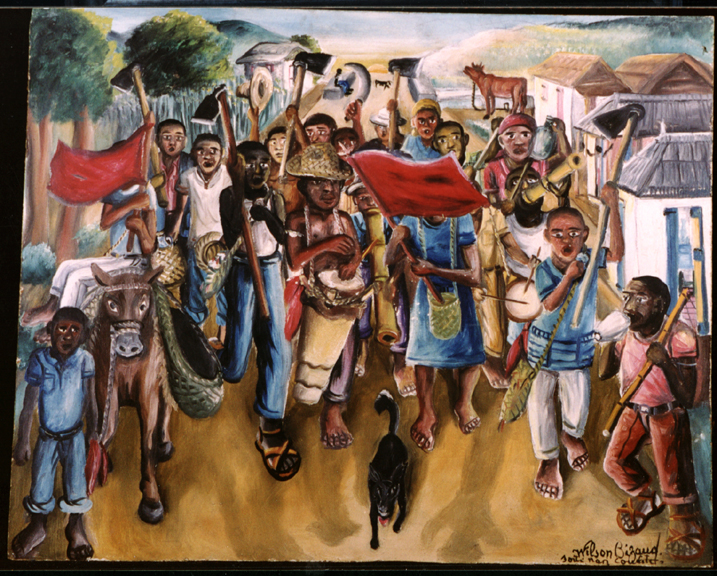
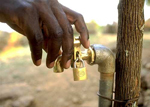

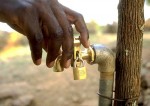

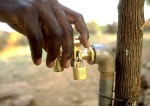

Comments
Strengthened Haiti-Venezuela-Argentina Collaboration | Renforcement de la coopération entre Haïti, le Venezuela et l’Argentine — No Comments